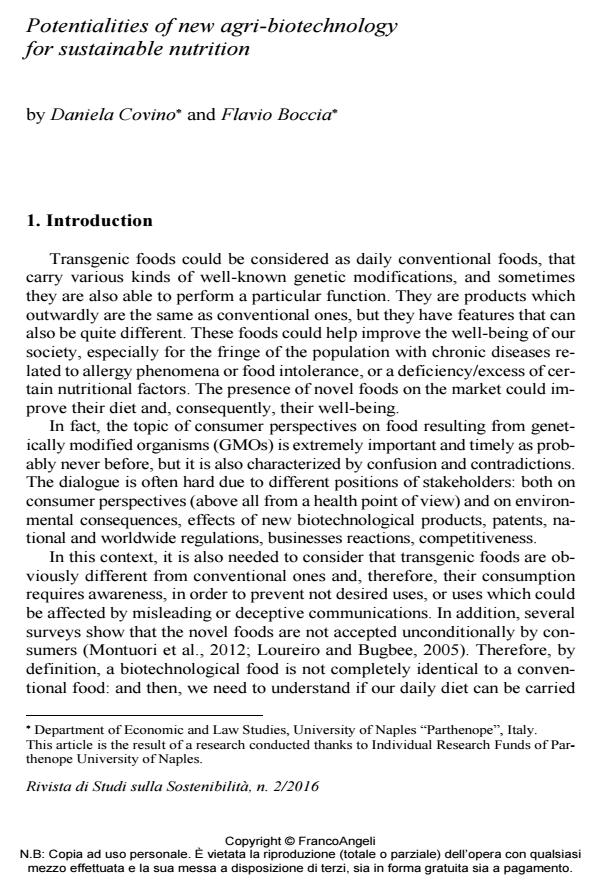Potentialities of new agri-biotechnology for sustainable nutrition
Titolo Rivista RIVISTA DI STUDI SULLA SOSTENIBILITA'
Autori/Curatori Daniela Covino, Flavio Boccia
Anno di pubblicazione 2017 Fascicolo 2016/2
Lingua Inglese Numero pagine 10 P. 97-106 Dimensione file 152 KB
DOI 10.3280/RISS2016-002009
Il DOI è il codice a barre della proprietà intellettuale: per saperne di più
clicca qui
Qui sotto puoi vedere in anteprima la prima pagina di questo articolo.
Se questo articolo ti interessa, lo puoi acquistare (e scaricare in formato pdf) seguendo le facili indicazioni per acquistare il download credit. Acquista Download Credits per scaricare questo Articolo in formato PDF

FrancoAngeli è membro della Publishers International Linking Association, Inc (PILA), associazione indipendente e non profit per facilitare (attraverso i servizi tecnologici implementati da CrossRef.org) l’accesso degli studiosi ai contenuti digitali nelle pubblicazioni professionali e scientifiche.
Transgenic foods could be considered as daily conventional foods, that carry various kinds of well-known genetic modifications, and sometimes they are also able to perform a particular function. They are products which outwardly are the same as conventional ones, but they have features that can also be quite different. These foods could help improve the well-being of our society, especially for the fringe of the population with chronic diseases related to allergy phenomena or food intolerance, or a deficiency/excess of certain nutritional factors. The presence of novel foods on the market could improve their diet and, consequently, their well-being. The aim of the present work is to focus on the potential role of second generation genetically modified foods of enhancing more sustainable dietary regimes in terms of welfare. Functional transgenic food may be defined as daily conventional ones, carrying modifications in nutrients content, capable of performing as dietary supplement. Nutritional characteristics may strongly differ from usual foods in our dietary regimen in terms of vitamins, fat, gluten and so on. It is well accepted that such a kind of food might contribute to improves societies’ welfare, especially for people affected by chronic disease depending on allergies or intolerance, deficiency or surplus of specific nutritional factors. Still, several issues are to debate in terms of their acceptability and equivalence.
I cibi transgenici potrebbero essere considerati come normali alimenti quotidiani, in grado però di apportare, grazie alle proprie caratteristiche genetiche di nuova generazione, contenuti nutrizionali specifici per particolari necessità alimentari dei singoli individui. Ma la considerazione che normalmente caratterizza tale genere di nuovi alimenti è di carattere totalmente diverso, spesso anzi molto osteggiato dall’opinione pubblica corrente. Scopo del presente lavoro è quello di porre attenzione al ruolo che in potenza potrebbero avere i cibi geneticamente modificati di nuova generazione nel miglioramento, dal punto di vista della sostenibilità, dei regimi dietetici in termini di benessere e salute del consumatore finale. Restano tuttavia aperte numerose questioni relative alla loro equivalenza sostanziale ed accettabilità da parte della collettività.
Parole chiave:Consumatore, marketing, OGM, salute, sicurezza.
- How labeling of genetically modified foods affects consumers’ purchase intentions: a multi-contextual analysis Zheng Yang, Yingdi Jiang, Yun Feng, Guoyan Wang, in GM Crops & Food /2025 pp.688
DOI: 10.1080/21645698.2025.2572191 - Knowledge and Food Sustainability: the Metaverse as a New Economic-Environmental Paradigm Flavio Boccia, Daniela Covino, in Journal of the Knowledge Economy /2023 pp.14841
DOI: 10.1007/s13132-023-01626-w - Metaverse, the last technological frontier of environmental sustainable food: Worldwide evidence from the first business case studies Flavio Boccia, Joanna Rosak-Szyrocka, Houman Hashemzadeh, Daniela Covino, in RIVISTA DI STUDI SULLA SOSTENIBILITA' 1/2023 pp.153
DOI: 10.3280/RISS2023-001009 - Genetically modified and socially responsible foods: A significant relationship for consumer's preferences Daniela Covino, Flavio Boccia, Immacolata Viola, in RIVISTA DI STUDI SULLA SOSTENIBILITA' 2/2022 pp.371
DOI: 10.3280/RISS2021-002024 - Neuromarketing: some remarks by an economic experiment on food consumer perception and ethic sustainability Daniela Covino, Immacolata Viola, Tetiana Paientko, Flavio Boccia, in RIVISTA DI STUDI SULLA SOSTENIBILITA' 1/2021 pp.187
DOI: 10.3280/RISS2021-001011
Daniela Covino, Flavio Boccia, Potentialities of new agri-biotechnology for sustainable nutrition in "RIVISTA DI STUDI SULLA SOSTENIBILITA'" 2/2016, pp 97-106, DOI: 10.3280/RISS2016-002009